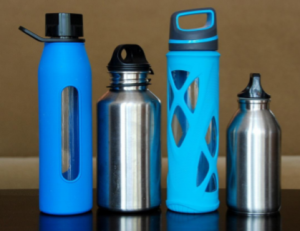 Did you know that millions of gallons of water are used to produce the plastic water bottles we purchase for water? Did you know one-quarter of that bottled water is from the tap? Did you know the plastics industry uses recycling as a way to sell un-recyclable plastic? Indeed, for the oil and gas industries, plastic, which is made from petroleum, is their lifeline. That means that production of the plastic bottles harms the environment as well as the water bottles that end up in the landfills, so plastic water bottles have a negative effect on our earth from beginning to end.
Did you know that millions of gallons of water are used to produce the plastic water bottles we purchase for water? Did you know one-quarter of that bottled water is from the tap? Did you know the plastics industry uses recycling as a way to sell un-recyclable plastic? Indeed, for the oil and gas industries, plastic, which is made from petroleum, is their lifeline. That means that production of the plastic bottles harms the environment as well as the water bottles that end up in the landfills, so plastic water bottles have a negative effect on our earth from beginning to end.
In addition, with the recent fracking boom causing low gas prices, fossil fuel companies are seeking other ways to bolster their profits — by making more plastic. Just as the world is starting to address its enormous plastic pollution problem, these companies are doubling down on plastic, with huge potential consequences for climate and the environment. Big companies like Exxon Mobil, Shell and Saudi Aramco, which see signs of a coming decline in fossil fuel use, are compensating for the low prices by investing in plastic production. As a result, the World Economic Forum expects plastic production to double by 2040 if something is not done to curtail its production efforts.
Introduce this topic of conversation among family and friends. Awareness of our actions in choices for either convenience or understanding of consequences helps to open our hearts to our connection with others and the environment. Creating an atmosphere of learning to care for our common home is a positive way to convey Pope Francis’ message in Laudato Si`. Many people are already reducing the amount of plastic by refusing to buy bottled water. For water on the go, you can use a pitcher and filtering system in your refrigerator. Then simply fill a reusable water bottle and take it with you.
Submitted by
Anne Theriault, St. Paul Parish
